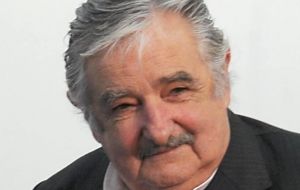MercoPress. South Atlantic News Agency
UN anti-drugs chief says 'legalization' is not a solution and points to Uruguay
 Yury Fedotov questions Uruguay's legalization because it is not fully in line with drug control provisions
Yury Fedotov questions Uruguay's legalization because it is not fully in line with drug control provisions  The bill sponsored by President Jose Mujica and its implementation is closely monitored by other countries
The bill sponsored by President Jose Mujica and its implementation is closely monitored by other countries Legalization will not solve the world's narcotics problem, the UN anti-drugs chief said on Monday, indicating disagreement with a decision by Uruguay to allow the growing, sale and smoking of marijuana.
In a move that will be closely watched by other nations debating drug liberalization, Uruguay's parliament in December approved a bill to legalize and regulate the sale and production of marijuana - the first country to take such a step.
In the United States, Washington and Colorado states recently legalized the sale of cannabis under license, although federal law in the country has not changed.
Yury Fedotov, executive director of the United Nations Office on Drugs and Crime (UNODC), said it was the prerogative of member states to decide “what needs to be done” and how they envisage the implementation of relevant international law.
”However, as the head of UNODC, I have to say that legalization is not a solution to the (world's) drug problem,“ Fedotov told reporters ahead of a major international meeting on the issue in Vienna on March 13-14.
”It is very hard to say that this law (adopted by Uruguay's parliament) is fully in line with legal provisions of the drug control conventions,” he said, referring to treaties including the 1961 Single Convention on Narcotic Drugs.
Uruguay's attempt to quell drug trafficking is being followed closely in Latin America, where the legalization of some narcotics is being increasingly seen by regional leaders as a possible way to end the violence spawned by the cocaine trade.
Other countries have decriminalized marijuana possession and the Netherlands allows its sale in coffee shops, but Uruguay will be the first nation to legalize the whole chain from growing the plant to buying and selling its leaves.
Uruguay's new marijuana laws are scheduled to take effect in April. Citizens will be allowed to grow up to six plants a year in their homes and will be able to buy up to 40 grams (1.4 ounces) a month at pharmacies licensed by the state.
In Mexico, left-wing senators last month presented an initiative to legalize medical marijuana, saying a new approach was needed to speed up drug liberalization and help end a cycle of cartel violence that has killed tens of thousands.




Top Comments
Disclaimer & comment rules-

-

Read all commentsI don't think even the most utopian Uruguayan legislator believes that legalisation is the solution to the world's drug problems. Yury Fedotov is deliberately missing the point.
Mar 11th, 2014 - 06:35 am 0Nearly all the heavy drug dealers in MVD come from Argentina.
Mar 11th, 2014 - 11:33 am 0Legalising drugs leads to more use (perhaps) of heavy narcotics because the legal ones have lost there “scary” factor for juvenile users (of any age).
But we will see if “No MoneyPepe” ever gets his arse in gear, gets the Army field planted, reaped, the authorised dealers licenced and the policia trained (I bet they forget that one).
Commenting for this story is now closed.
If you have a Facebook account, become a fan and comment on our Facebook Page!